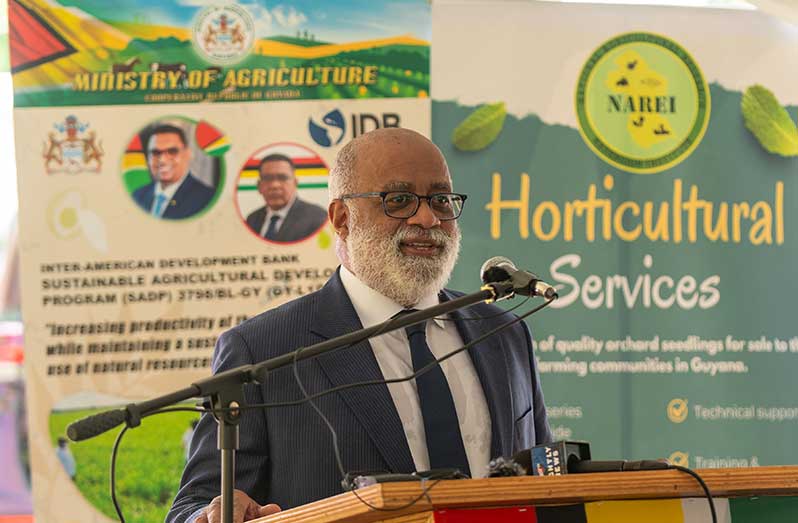–with modernised $100M soil chemical services laboratory at NAREI
NOW equipped with cutting edge technology, Guyana’s soil chemical services laboratory will serve as an integral component of the government’s overarching plan to boost the country’s food production and agriculture ecosystem.
The upgraded laboratory, located at the National Agricultural Research and Extension Institute (NAREI), Mon Repos, was commissioned on Monday, October 7, by Agriculture Minister Zulfikar Mustapha.

“For over a decade, with limited resources, NAREI has worked tirelessly to conduct soil testing and analysis to provide essential recommendations to farmers and key analyses such as PH, electrical conductivity, organic carbon phosphorus and so on,” Mustapha said.
With the support in the form of funding from the Inter-American Development Bank (IDB), some $100 million was spent to procure modern equipment, as well as facilitate infrastructural upgrades to the facility.
Mustapha said: “This here what we are doing is part of our programme to modernise Guyana’s agriculture sector because we are making deliberate assessments together with the IDB in innovation and technology.”
He related that the rehabilitation of the facility is a prime example of how collaboration and technology are at the heart of the region’s agricultural transformation.
“What we are doing, we are modernising the agriculture sector… It is about transforming tomorrow, building resilient agriculture systems that secures our nations and further the regions and bolster our food security in CARICOM [Caribbean Community],” Mustapha said.
Strategically, investments are being made to strengthen the Ministry of Agriculture’s research and extension services, and the soil testing facility will aid in providing better deliverables for farmers countrywide.
“When you know what’s in the soil then you can enhance and have better yield,” Mustapha said.
The new lab features a soil grinder, carbon analyser, a nitrogen analyser and other key equipment to not only conduct soil testing but other pathogen test.
“With these new tools and with these new equipment, I think we will be ready to chart the way forward,” the Agriculture Minister said.
EXTENSION OFFICERS
Mustapha noted that the new facility will require local extension officers to boost their capability, highlighting their crucial role in being the link between the research institute and farmers.
With this new facility, extension officers will work even more closely with the lab technicians to ensure that farmers receive the best yields. Mustapha related that there will be real-time testing and monitoring of soil.

He said that a research officer could be stationed in Region Nine and with the requisite equipment, information and samples, can be sent to the laboratory in Mon Repos, where testing will be done and the findings can be shared with the extension officer and farmer.
Mustapha said: “We have to do things in a more scientific way… that is why we are now modernising the sector; we have a lab here now.”
According to Mustapha, the Ministry is also looking to soon commission a food safety lab.
The IDB’s General Manager, Country Department Caribbean Group, Anton Edmunds reiterated that the laboratory would play a crucial role in providing accurate soil analysis.
Edmunds said: “Today is not just about upgrading facilities, it’s about empowering the agriculture sector with the tools and the knowledge necessary to improve soil health, increase crop yield and to ensure food security.”
The IDB has been a crucial partner in Guyana, facilitating the roll out of numerous projects under the umbrella of its Sustainable Agricultural Development Programme.
According to Edmunds, this programme aims to increase productivity of the agriculture sector while maintaining a sustainable and climate resilient use of natural resources in Guyana.
Some of the key objectives of this programme includes: Production of high quality data for the agriculture sector; increase productivity, especially for medium and small farmers; and increase sanitary and phytosanitary (SPS) standards and access to meat processing facilities.




.jpg)










